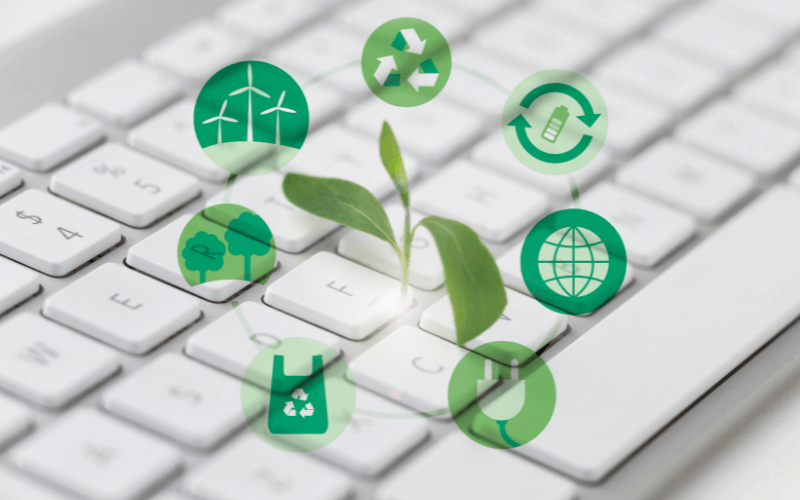In a world of rapid transformations, companies are preparing for a 2025 scenario where technology, sustainability, and new forms of work and consumption will shape business.
This blog explores the five major trends that will impact the corporate environment, highlighting how these changes can define organizations' future success. Enjoy the read!
What you will find on this blog:
Toggle1. Digital Transformation
Digital transformation will remain a driving force in the business environment in 2025. Companies that fail to adopt new technologies will be at a competitive disadvantage. Automation and artificial intelligence (AI) will be fundamental, reducing manual tasks and improving operational efficiency. AI tools like machine learning will help companies predict market trends and enhance decision-making.
1.1 The Importance of Digitalization
Digitalization involves integrating digital technologies into all aspects of a business, from internal operations to customer interactions. It enables companies to make processes more efficient, reduce costs, and improve customer experience. By 2025, companies that haven’t embraced digital technologies will face significant disadvantages.
1.2 Automation and Artificial Intelligence
Automation and artificial intelligence (AI) will be essential to digital transformation. Companies across various industries are implementing AI tools to automate repetitive processes, such as customer support and data analysis. For example, chatbots increasingly provide immediate customer support, enhancing the shopping experience.
1.3 Cloud Computing and Digital Security
Another critical aspect of digital transformation is cloud computing. In 2025, more companies will migrate their systems and data to the cloud, offering greater flexibility, scalability, and security. Cybersecurity will also be a priority, as the increase in digital data will require more robust solutions to protect sensitive information from companies and their customers.
2. Sustainability and ESG (Environmental, Social, and Governance)

Sustainability is becoming a core element of business strategies, with ESG as the new decision-making criterion. Investors and consumers are increasingly demanding that companies operate ethically and responsibly. In 2025, ESG practices will be even more embedded in business operations, promoting greater transparency and accountability.
2.1 ESG as a Decision-Making Criterion
ESG, referring to environmental, social, and governance practices, is becoming a decisive factor for investors and consumers. In 2025, companies that do not incorporate ESG into their operations risk losing credibility and market share. Consumers increasingly prefer brands that align with their values, particularly regarding environmental and social responsibility.
2.2 Impact on Companies and Consumers
Adopting sustainable practices can also bring financial benefits. Companies investing in ESG often show better long-term financial performance, as investors perceive them as less risky. Additionally, waste reduction, use of renewable energy, and a commitment to diversity and inclusion attract more loyal consumers.
3. Circular Economy

The circular economy will also be a key focus in 2025. This business model aims to minimize waste by promoting the reuse and recycling of materials. Companies adopting circular practices will be viewed as pioneers in sustainable innovation, creating revenue streams through product reuse.
Industries such as fashion and technology are already exploring ways to design products that can be dismantled and reused, reducing environmental impact and creating a more sustainable production cycle.
3.1 New Circular Business Models
Companies across different sectors adopt circular business models, where products are designed to last longer, be repaired, or recycled. A clear example is the fashion industry, where brands develop collections made from recycled materials and encourage customers to return used clothes for repurposing.
Other industries, like technology, are also investing in circular practices. Companies like Apple and Samsung are developing modular products that can be upgraded or repaired rather than discarded.
4. Hybrid and Remote Work
Remote work, widely adopted during the pandemic, is evolving into a hybrid model by 2025. Workplace flexibility has become an expectation among employees, and companies that adapt to this new paradigm will have a more engaged workforce.
4.1 New Technologies for Remote Work
Technological advancements will be essential to ensuring remote work efficiency. Video conferencing tools, cloud collaboration platforms, and cybersecurity solutions will continue to evolve, enabling teams to work together from anywhere in the world. Additionally, augmented reality (AR) and virtual reality (VR) technologies could transform how employees interact remotely.
Companies investing in robust technological infrastructure with secure and collaborative solutions will be better positioned to retain talent and increase competitiveness.
5. Mass Personalization

Mass personalization will be a significant trend in the coming years. Consumers increasingly demand tailored products and services, and companies offering personalized experiences will be more competitive.
Companies can analyze consumer behavior using big data and artificial intelligence and offer highly customized solutions. This is especially relevant in digital marketing, where data-driven campaigns can reach the right audience with the ideal message at the right time.
5.1 Customized Products and Services
Companies that tailor their offerings to customer preferences will stand out. This means products and services will no longer be "one size fits all" but adapted to each consumer's needs. Retail brands, for example, can use past purchase data to suggest products that match each customer’s style and preferences.
Count on Actio in 2025: Solutions tailored to your organization
In an increasingly competitive and dynamic business environment, efficient management processes are essential for success. Actio combines cutting-edge technology with best management practices to provide complete solutions that help you automate, centralize, and track all business processes.
Prepare for 2025 with Actio , ensuring your organization can overcome challenges and seize future opportunities.
Conclusion
The business trends for 2025 reveal a future where technology, sustainability, and personalization will be at the heart of corporate operations. Companies embracing these changes will be able to thrive in a competitive and dynamic environment. Adapting to these trends is not just a choice but necessary to ensure relevance and success in the coming years.
Frequently asked questions
1. How will digital transformation impact businesses in 2025?
Digital transformation will enable greater automation and operational efficiency, helping companies make more informed decisions and adapt quickly to market changes.
2. Why is digital transformation essential for 2025?
Digital transformation is crucial because it improves efficiency, automates processes, and allows companies to respond rapidly to market changes.
3. What challenges will companies face in 2025?
Some key challenges include adapting to new technologies, implementing ESG practices, and maintaining data security in an ever-evolving digital environment.
Don’t forget to follow Actio on Instagram, Linkedin and Facebook.
Did you like the content? Tell me in the comments.







